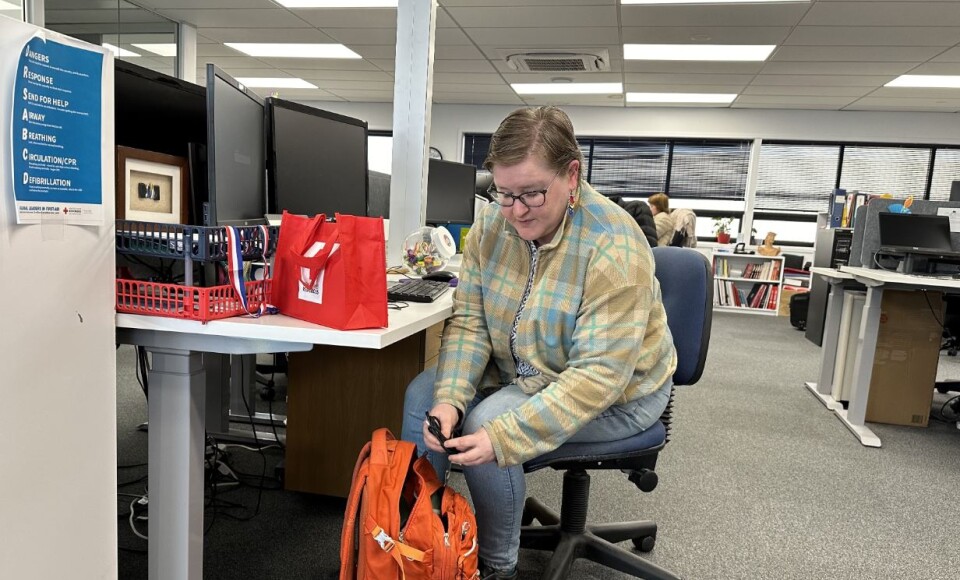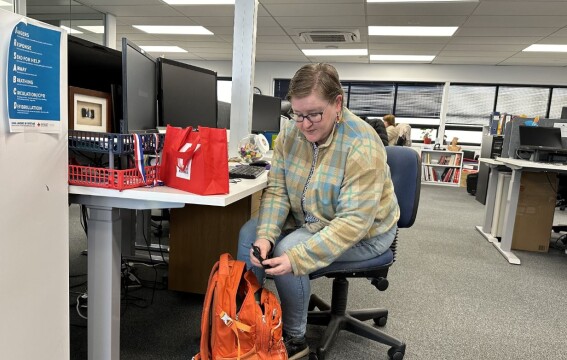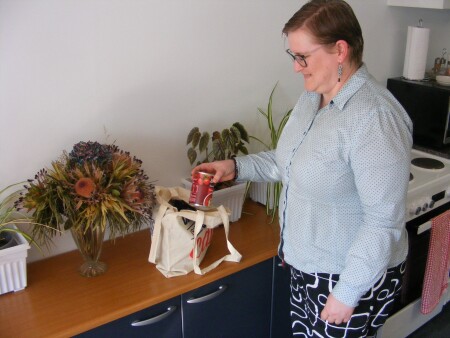Emergency preparedness – eating the elephant one bite at a time!
22 October 2024


Get prepared for an emergency or disaster is a very broad statement. What does it actually mean?
Sonia Fitchett, has had her share of emergencies and disasters – coping with the Port Hills fires of 2017 and the Canterbury earthquakes of 2010-2011.
“You can read all the stuff about preparedness but when a disaster actually happens it is surreal. It’s like watching a movie, but it’s happening to you,” she says.
Sonia’s day job is working for New Zealand Red Cross as an Advisor on Planning, Monitoring, Evaluation and Reporting for our First Aid work. Her experience of the Canterbury earthquakes led her to join Red Cross as part of the Earthquake Recovery Team for nine years. Now, she is also a volunteer Disaster Welfare and Support deputy team lead, and part of our national training working group ensuring disaster and emergency training is up to date.
While Sonia lives and breathes preparedness, for many of us it may seem an overwhelming task and something ‘I’ll do tomorrow'.
A lot of people are aware it’s important to know the potential hazards where they live, make an emergency plan, including household supplies, and to share the plan with a neighbour. However, just two in every five New Zealanders feel they are prepared, according to research by the National Emergency Management Agency, (NEMA).
“Many people say they don’t like to think about it because it’s going to make something happen, but it’s small actions that make a difference,” says Sonia.
“Preparedness for me means making a couple of changes, so when things go wrong, you’ve smoothed the way and can cope better. It’s about thinking about what you take to work, what you have at work, and how you can manage if you can't get home.”
The Christchurch earthquakes experience has cemented some essential small changes in Sonia’s everyday life.
Carry cash and stock up your kitchen cupboard

That extra can of soup in Sonia’s shopping
That extra can of soup in Sonia’s shopping
She always carries some cash. “In the 2011 Christchurch earthquake the power was off, that also meant no online services, or operational cash machines. Cash was essential in those first few days.” Sonia says she also always carries a phone charger and cable in her bag.
Another small thing Sonia has continued to do is buy an extra tin of soup in the regular household shop. This means her family always has a good stock of spare in-date cans in the cupboard.
“With the power down, we dragged out our gas barbeque into the middle of the cul de sac and put a big pot of soup on to feed our neighbours and ourselves.”
Sonia believes even if you do one thing it’s better than doing nothing to prepare. “These small things help maintain your thread of normality when everything is collapsing around you.”
Know where to find your important documents, a coat and walking shoes
For evacuation in a hurry, Sonia is well equipped at home with extra food and water, and her grab bag filled and ready to go, including a radio and walking shoes, and emergency equipment in her car such as a blanket, shovel and first aid kit.
However, she’s also learned that your grab bag needs to be by the door.
During the Christchurch earthquake a bookcase had come down in Sonia’s home and blocked off the room where her grab bag was kept. “Grab bags are only good if you can access them. I keep mine by the door now.”
Sonia recognises premade grab bags with an extra pair of shoes and jackets are out of reach for many of us. Preparedness needs to be tailored to the individual person to be useful.
If you don’t have spare clothing, footwear and a radio, having an essentials list on your fridge and knowing where those things are in the house is often the next best thing, especially if you have to evacuate in a hurry. She says in some emergencies like a fire, you’d just get out immediately but for other situations where you may have a short window to prepare to leave, the list on the fridge is a good reminder of what you need.
Getting to know your neighbours
Sonia says she learned a lot from her experiences. For example, during the Port Hills fire of 2017, the family were living in Westmorland. Her mother was driving back to the house and was stopped at a barrier. “She couldn’t get home. That was a new scenario for all our family. We had plans if we were stuck at home, but not if we couldn’t get home. Luckily, we have other family in Christchurch, and I joined my mother there. I had to self-evacuate from home but had a little time to prepare and could take those critical things we needed.”
Sonia has also learned the importance of getting to know her neighbours. “People won’t have everything they need but we can share. Someone might have more water, and others might be able to share food, like soup.”
Introducing yourself to the people next door and getting to know them a little bit paves the way for local contact. In times of emergencies and disasters, local authorities will be under a lot of pressure so what we can do in our local communities to share resources and look out for each other helps everyone.
Emergency scenarios fall into three major situations: staying at home, having to leave home, and already away and can’t get home. Sonia’s car now contains a pair of jump leads, a blanket, a first aid kit and some water. She’s prepared for all three situations. Thinking ahead about what we’d need does help us prepare. That’s why the small changes matter.
Find out more
Become a Disaster Response Alliance Partner
- The Disaster Response Alliance offers a unique partnership between New Zealand Red Cross and leading businesses committed to building community resilience in Aotearoa New Zealand. By contributing expertise, resources, and fundraising support, partners ensure that we can respond quickly and effectively in an emergency. For more information email company@redcross.org.nz.
Learn more about the Disaster Response Alliance and how you become a partner
Get prepared - complete Good and Ready Essentials
- Prepare for a disaster - get Good and Ready.
Good and Ready - We partner with, and use content provided by the National Emergency Management Agency (NEMA).
Get Ready - National Emergency Management Agency
Volunteer
- If you want to get involved in our work, join us! We have over 40 branches across the motu and volunteer roles to suit everyone.
Become a DWST Volunteer
Find a Volunteer Role
Become a member of New Zealand Red Cross
Lead photo: Sonia at her desk with charger.
